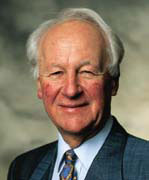From the Advent's Website

What we should do
by John Stott
http://www.anglicanplanet.net/
September 2005
What unites us is plain. We are members of the Anglican Church who are increasingly disturbed by its current plight. An appreciable number of its leaders are guilty of multiple unfaithfulness. Doctrinal truth and ethical standards which are plainly taught by scripture, and which the Church has accepted from the beginning, are now being challenged and even summarily rejected.
So what should we do? Broadly speaking, we have three options. The first is to get out (the way of secession). The second is to give in (the way of compromise). The third option is to stay in, while refusing to give in (the way of witness). Let’s consider these separately.
The first option is to get out. There are faithful men and women in the Anglican Church who say: "To stay in an unfaithful church like ours would be an intolerable compromise. In order to retain our Christian integrity, we have no alternative but to drop out." Now we should not altogether dismiss this as a possible option. If the Church were to deny one of the central truths of the creed, like the incarnation, the atonement or the resurrection, it would cease to be a church. It would be apostate. Then we would be obliged to leave it. But thank God that lamentable situation has not arrived. The time to leave has not come.
What secessionists tend to forget is that the New Testament lays more emphasis on fellowship than on separation; and that separation, or secession, is demanded only in extreme situations. Thus the apostle Paul pronounces an "anathema" on any teacher who denies the gospel of free grace (Galatians 1:6), and the apostle John calls "antichrist" anyone who denies the divine-human person of Jesus (I John 2:18). The 16th century reformers were themselves very reluctant schismatics. They dreamed of a catholicism reformed according to the word of God. They regarded schism as a sin, and did not leave of their own accord or with relish. It is the false teachers who should secede (I John 2:19), not the true teachers.
Besides, to develop a pragmatic argument, the large secessions of Methodists in the 18th century, and of the Reformed Episcopalians in the 19th century, left the church weaker, not stronger. If they had stayed, would not our evangelical testimony in the Anglican Church be much more effective today? So then, as long as we can do so with a good and a clear conscience, I think we should stay, not leave.
If the first option is to get out, the second is not only to stay in but to give in. I am now thinking of Anglicans who are determined to stay in the Church at all costs, even at the cost of betraying the gospel. They prefer to swim with the stream or "go with the flow". They are exhibiting the spirit of the age, and not least, the spirit of post-modernism. For according to post-modernism, there is no such thing as an objective and universal truth: there is only a multiplicity of time and culture-conditioned truths.
But our Lord Jesus and His apostles were of a different mind. They call us to defend and proclaim the truth, and to recognize and oppose false teachers. We are to have the courage to "fight the good fight of the faith". We are not to be like reeds shaken by the wind, but like rocks in a mountain torrent.
The third option is to stay in, while refusing to give in. Frankly, it is the most painful of the three options, and it causes us considerable misery. The other two options are psychologically easier because they break the tension. If we either get out or give in the tension ceases. But if we stay in while refusing to give in, we find ourselves walking a tightrope, and living in a permanent and painful state of tension. But we are called to this.
Here then are the three options. Secession is to pursue truth at the expense of unity. Compromise is to pursue unity at the expense of truth. Witness is to pursue truth and unity simultaneously. This seems to be the biblical way. We are to "maintain the truth in love" (Ephesians 4:15).
Supposing we agree with this, that we are called to stay in without giving in, what would this involve? I would like to make six suggestions. Firstly, we must be patient. Church history has been defined as the story of the patience of God. Certainly He is the God of history; the God of Abraham, Isaac, and Jacob; the God of Moses and the prophets; the God of Jesus, the apostles, and the post-apostolic Church.
Moreover, God has been extraordinarily patient with his wayward Church. He is also at work, and sovereign. He will not allow error to triumph. As Paul wrote, "We cannot do anything against the truth, but only for the truth" (II Corinthians 13:18).
Secondly, we must judge the Church by its official formularies and not by the wild utterances of a few idiosyncratic leaders. The Anglican Communion continues to look to the Prayer Book and Articles as its foundation documents, even where subscription to them has been relaxed. We refuse to contradict our inheritance. History declares the Anglican Church to be biblical, reformed, and evangelical, so that we may rightly claim to be its authentic proponents.
Thirdly, we must adopt the strategy of the apostle Paul. False teachers were invading, disturbing and corrupting the churches in his day. What did he do in this situation? His solution to the problem was neither secession nor compromise. Instead, when false teachers increase, Paul took steps to multiply the number of true teachers who would be able to give instruction in sound doctrine and refute those who contradict it. This was his teaching to Titus (Titus 1:9).
Fourthly, we must distinguish between primary and secondary issues, between what is central and what is circumferential. We can then determine what the vital issues are on which we have to protest and fight, while at the same time giving one another liberty in some areas in which scripture is not altogether clear. This could be called a "principled" comprehensiveness. Dr Alec Vidler stated the matter well: "In these latter days the conception of Anglican comprehensiveness has been taken to mean that it is the glory of the Church of England [i.e. Anglicanism] to hold together in juxtaposition as many varieties of Christian faith and practice as are willing to agree to differ, so that the church is regarded as a sort of league of religions... The true principle of comprehension is that a church ought to hold the fundamentals of the faith, and at the same time allow for differences of opinion and interpretation in secondary matters, especially rites and ceremonies" (Essays in Liberality).
Fifthly, we must encourage more faithful scholarship. In the early centuries the church fathers not only outlived and out-loved but out-thought their opponents. By contrast, in our own day, many evangelical people despise and reject scholarship. It is an extremely serious situation. I do not hesitate to say that anti-intellectualism and the fullness of the Holy Spirit are mutually incompatible. Since the Holy Spirit is "the Spirit of truth" as Jesus called Him, wherever he is in control truth matters.
Sixthly and lastly, we must embody our message. As Paul wrote to the Philippians, "Let your manner of life be worthy of the gospel of Christ" (1:27). It is not enough for us to defend and proclaim the faith; we have to live and express it. We lack all credibility when people perceive a dichotomy between what we say and what we are. John Poulton, at one time adviser on evangelism to the Archbishop of Canterbury, in his book called A Today Sort of Evangelism (Lutterworth 1972) wrote, "The most effective evangelism comes from those who embody the things they are saying. They are their message... Christians need to look like what they are talking about... What communicates now is basically personal authenticity." So, by the power of the Holy Spirit, we must develop both Christian lives and Christian churches in which Christ is made visible again.
Two of the options we have considered (to get out or give in) are ultimately defeatist, whereas to stay in while refusing to give in seems to me to be the way of courage. We need again to hear God’s Word to his people: Do not fear, for I am with you; do not be discouraged, for I am your God. I will strengthen you and help you; I will uphold you with my righteous right hand" (Isaiah 41:10).
John Stott is a priest in the Church of England, and is one of the most popular and prolific Anglican writers of his generation. He is also a popular speaker, well known throughout the Anglican Communion, and the ecumenical community.


0 Comments:
Post a Comment
<< Home